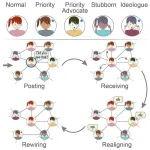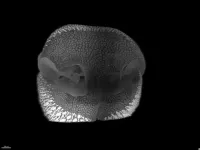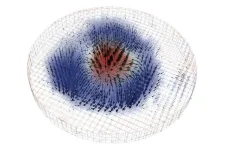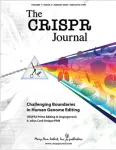(Press-News.org) The interaction between humans and artificial intelligence is shaping a new thinking system, a new cognitive scheme, external to the human mind, but capable of enhancing its cognitive abilities. This is called System 0, which operates alongside the two models of human thought: System 1, characterized by intuitive, fast, and automatic thinking, and System 2, a more analytical and reflective type of thinking. However, System 0 introduces an additional level of complexity, radically altering the cognitive landscape in which we operate, and could thus mark a monumental step forward in the evolution of our ability to think and make decisions. It will be our responsibility to ensure that this progress will be used to improve our cognitive autonomy without compromising it.
This is reported by the prestigious scientific journal Nature Human Behaviour, in an article titled "The case for human-AI interaction as System 0 thinking" – [link](https://www.nature.com/articles/s41562-024-01995-5), written by a team of researchers led by Professor Giuseppe Riva, director of the Humane Technology Lab at Università Cattolica's Milan campus and the Applied Technology for Neuropsychology Lab at Istituto Auxologico Italiano IRCCS, Milan, and by Professor Mario Ubiali (I NEED THE COMPLETE AFFILIATION) from Università Cattolica's Brescia campus. The study was directed with Massimo Chiriatti from the Infrastructure Solutions Group, Lenovo, in Milan, Professor Marianna Ganapini from the Philosophy Department at Union College, Schenectady, New York, and Professor Enrico Panai from the Faculty of Foreign Languages and Language of Science at Università Cattolica's Milan campus.
A new form of external thinking
Just as an external drive allows us to store data that are not present on the computer, we can work by connecting our drive to a PC wherever we are, artificial intelligence, with its galactic processing and data-handling capabilities, can represent an external circuit to the human brain capable of enhancing it. Hence the idea of System 0, which is essentially a form of "external" thinking that relies on the capabilities of AI.
By managing enormous amounts of data, AI can process information and provide suggestions or decisions based on complex algorithms. However, unlike intuitive or analytical thinking, System 0 does not assign intrinsic meaning to the information it processes. In other words, AI can perform calculations, make predictions, and generate responses without truly "understanding" the content of the data it works with.
Humans, therefore, have to interpret on their ones and giving meaning to the results produced by AI. It's like having an assistant that efficiently gathers, filters, and organizes information but still requires our intervention to make informed decisions. This cognitive support provides valuable input, but the final control must always remain in human hands.
The risks of System 0: loss of autonomy and blind trust
“The risk,” professors Riva and Ubiali emphasize, “is relying too much on System 0 without exercising critical thinking. If we passively accept the solutions offered by AI, we might lose our ability to think autonomously and develop innovative ideas. In an increasingly automated world, it is crucial that humans continue to question and challenge the results generated by AI,” the experts stress.
Furthermore, transparency and trust in AI systems represent another major dilemma. How can we be sure that these systems are free from bias or distortion and that they provide accurate and reliable information? “The growing trend of using synthetic or artificially generated data could compromise our perception of reality and negatively influence our decision-making processes,” the professors warn.
AI could even hijack our introspective abilities, they note—i.e., the act of reflecting on one’s thoughts and feelings—a uniquely human process. However, with AI's advancement, it may become possible to rely on intelligent systems to analyze our behaviors and mental states. This raises the question: to what extent can we truly understand ourselves through AI analysis? And can AI replicate the complexity of subjective experience?
Despite these questions, System 0 also offers enormous opportunities, the professors point out. Thanks to its ability to process complex data quickly and efficiently, AI can support humanity in tackling problems that exceed our natural cognitive capacities. Whether solving complex scientific issues, analyzing massive datasets, or managing intricate social systems, AI could become an indispensable ally.
To leverage the potential of System 0, the study's authors suggest it is urgent to develop ethical and responsible guidelines for its use. “Transparency, accountability, and digital literacy are key elements to enable people to critically interact with AI,” they warn. “Educating the public on how to navigate this new cognitive environment will be crucial to avoid the risks of excessive dependence on these systems.”
The future of human thought
They conclude: If left unchecked, System 0 could interfere with human thinking in the future. “It is essential that we remain aware and critical in how we use it; the true potential of System 0 will depend on our ability to guide it in the right direction.”
END
Artificial intelligence is creating a new way of thinking, an external thought process outside of our minds
The 'System 0', which in the future will support and enhance our cognitive abilities, is the ongoing revolution described in the journal Nature Human Behaviour by a multidisciplinary group of scientists coordinated by experts from Università Cattolica, c
2024-10-22
ELSE PRESS RELEASES FROM THIS DATE:
Reaction conditions tune catalytic selectivity
2024-10-22
UPTON, N.Y. — Chemists at the U.S. Department of Energy’s (DOE) Brookhaven National Laboratory have developed a new theoretical framework for more accurately predicting the behavior of catalysts. These collections of atoms lower the energy needed for countless chemical reactions. The study reveals how conditions such as temperature and pressure can change a catalyst’s structure, efficiency, and even the products it makes. The findings are published in the journal Chem Catalysis.
“Our results highlight the significant impact ...
Verified users on social media networks drive polarization and the formation of echo chambers
2024-10-22
When X (formerly Twitter) changed its verification system in 2022, many foresaw its potential to impact the spread of political opinions on the platform. In a modeling study publishing October 22 in the Cell Press journal iScience, researchers show that having verified users whose posts are prioritized by the platform’s algorithms can result in increased polarization and trigger the formation of echo chambers. Because X’s new verification system allows almost anybody to become verified, this side effect could be taken advantage of by users wishing to manipulate others’ opinions, the researchers say.
“Our findings confirm ...
Get a grip: The best thumb position for disc launch speed and spin rate
2024-10-22
WASHINGTON, Oct. 22, 2024 – Disc golf is a sport growing in popularity, but there hasn’t been much research into the best techniques – until now.
Researcher Zachary Lindsey and his team studied professional and amateur disc golf players in Georgia to analyze the effect of thumb grip on disc-throwing.
“Participants were eager and excited to engage in the study, as there is clearly a thirst for scientific evidence and data to drive progress in the sport so that disc golf enthusiasts can improve their game in recreational and competitive contexts,” ...
Maternal eating disorders, BMI, and offspring psychiatric diagnoses
2024-10-22
About The Study: In this population-based cohort study including 392,000 mothers and 649,000 offspring, offspring from mothers with an eating disorder history or pre-pregnancy body mass index (BMI) outside normal weight were at higher risk of psychiatric disorders. The results differed somewhat between the 2 exposures with regard to which offspring diagnoses had associations, and effect sizes were typically larger for maternal eating disorders vs BMI. These findings suggest a need to consider these 2 exposures clinically to help prevent offspring mental illness.
Corresponding Author: To contact the corresponding author, Ida A. K. Nilsson, PhD, email ida.nilsson@ki.se.
To ...
Geometric mechanics shape the dog's nose
2024-10-22
The noses of many mammals, such as dogs, ferrets and cows, feature grooves forming a multitude of polygons. A team from the University of Geneva (UNIGE) has analyzed in detail how these patterns form in the embryo using 3D imaging techniques and computer simulations. The researchers discovered that differential growth of the skin tissue layers leads to the formation of domes, which are mechanically supported by the underlying blood vessels. This work describes for the first time this morphogenetic process, which could help explain the formation of other biological structures ...
‘Visual clutter’ alters information flow in the brain
2024-10-22
New Haven, Conn. — Whether we’re staring at our phones, the page of a book, or the person across the table, the objects of our focus never stand in isolation; there are always other objects or people in our field of vision. How that visual “clutter” affects visual processing in the brain, however, is not well understood.
In a new study published Oct. 22 in the journal Neuron, Yale researchers show that this clutter alters how information flows in the brain, as does the precise location of that clutter within the wider field of vision. The findings ...
Researchers succeed in taking 3D x-ray images of a skyrmion
2024-10-22
A difficult-to-describe nanoscale object called the magnetic skyrmion might one day yield new microelectronic devices that can do much more — for example, massive data storage — all while consuming much less power.
But researchers need a more detailed understanding of skyrmions if they are ever to be used reliably in computational devices, including quantum computers. Peter Fischer, a senior researcher at the Department of Energy’s Lawrence Berkeley National Laboratory (Berkeley ...
MRI can save rectal cancer patients from surgery, study suggests
2024-10-22
Magnetic resonance imaging (MRI) can spare many patients with rectal cancer from invasive surgery that can carry lifelong side effects, new research indicates.
The findings, from UVA Cancer Center’s Arun Krishnaraj, MD, MPH, and collaborators, indicate that MRI can predict patient outcomes and the risk of the tumor reccurring or spreading for patients who have undergone chemotherapy and radiation.
That information could be extremely useful in determining the best course of treatment and deciding whether a patient can ...
Fyodor Urnov on clinical crisis in CRISPR genome editing
2024-10-22
New Rochelle, NY, October 18, 2024—An invited Guest Editorial entitled “Give Cas a Chance,” by Fyodor Urnov, PhD, Director of Technology & Translation at the Innovative Genomics Institute (IGI), anchors the October 2024 special issue of The CRISPR Journal on “CRISPR Trials.”
As guest editor of the special issue, Dr. Urnov has penned an extraordinary editorial that emphatically defines the magnitude of the crisis in the genome editing arena and offers a path forward. The inherently programmable nature of CRISPR gene editing that makes it ...
People with type 2 diabetes who eat low-carb may be able to discontinue medication
2024-10-22
WASHINGTON—Adults with type 2 diabetes on a low-carbohydrate diet may see benefits to their beta-cell function allowing them to better manage their disease and possibly discontinue medication, according to new research published in the Endocrine Society’s Journal of Clinical Endocrinology & Metabolism.
Beta-cells are endocrine cells in the pancreas that produce and release insulin, the hormone that controls blood sugar levels.
More than 38 million Americans have diabetes, and over 90% of them have ...
LAST 30 PRESS RELEASES:
Novel camel antimicrobial peptides show promise against drug-resistant bacteria
Scientists discover why we know when to stop scratching an itch
A hidden reason inner ear cells die – and what it means for preventing hearing loss
Researchers discover how tuberculosis bacteria use a “stealth” mechanism to evade the immune system
New microscopy technique lets scientists see cells in unprecedented detail and color
Sometimes less is more: Scientists rethink how to pack medicine into tiny delivery capsules
Scientists build low-cost microscope to study living cells in zero gravity
The Biophysical Journal names Denis V. Titov the 2025 Paper of the Year-Early Career Investigator awardee
Scientists show how your body senses cold—and why menthol feels cool
Scientists deliver new molecule for getting DNA into cells
Study reveals insights about brain regions linked to OCD, informing potential treatments
Does ocean saltiness influence El Niño?
2026 Young Investigators: ONR celebrates new talent tackling warfighter challenges
Genetics help explain who gets the ‘telltale tingle’ from music, art and literature
Many Americans misunderstand medical aid in dying laws
Researchers publish landmark infectious disease study in ‘Science’
New NSF award supports innovative role-playing game approach to strengthening research security in academia
Kumar named to ACMA Emerging Leaders Program for 2026
AI language models could transform aquatic environmental risk assessment
New isotope tools reveal hidden pathways reshaping the global nitrogen cycle
Study reveals how antibiotic structure controls removal from water using biochar
Why chronic pain lasts longer in women: Immune cells offer clues
Toxic exposure creates epigenetic disease risk over 20 generations
More time spent on social media linked to steroid use intentions among boys and men
New study suggests a “kick it while it’s down” approach to cancer treatment could improve cure rates
Milken Institute, Ann Theodore Foundation launch new grant to support clinical trial for potential sarcoidosis treatment
New strategies boost effectiveness of CAR-NK therapy against cancer
Study: Adolescent cannabis use linked to doubling risk of psychotic and bipolar disorders
Invisible harms: drug-related deaths spike after hurricanes and tropical storms
Adolescent cannabis use and risk of psychotic, bipolar, depressive, and anxiety disorders
[Press-News.org] Artificial intelligence is creating a new way of thinking, an external thought process outside of our mindsThe 'System 0', which in the future will support and enhance our cognitive abilities, is the ongoing revolution described in the journal Nature Human Behaviour by a multidisciplinary group of scientists coordinated by experts from Università Cattolica, c






